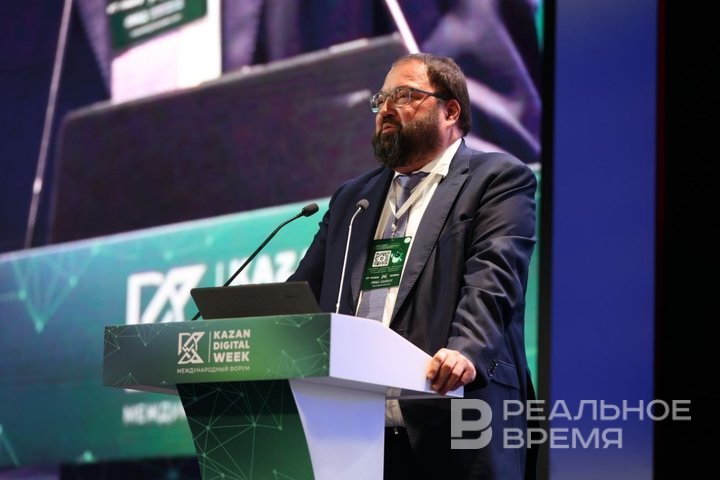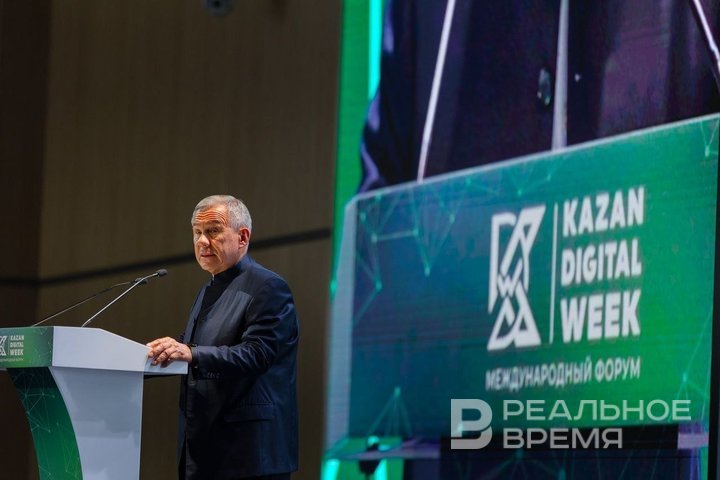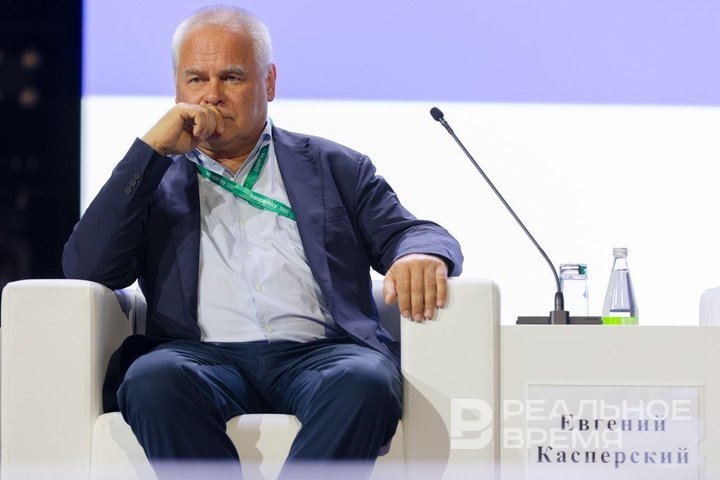Maksut Shadaev: Russia to open Internet access via satellite
Kazan Digital Week has started in Kazan

“No matter what they say [about the importance of digital], but the Ministry of Finance is, perhaps, more important than [the Ministry of Digital Development — author's note]," Maksut Shadaev impromptu made a joking remark into a short dialogue that suddenly broke out at the plenary session of Kazan Digital Week 2024. However, they did not talk about money, focusing on ensuring the technological sovereignty of the country. Russia is ready to build its own low-orbit satellite constellation for Internet access, support new developments in the field of artificial intelligence, the head of the Ministry of Digital Development of Russia has outlined priorities. Meanwhile, experts predict the emergence of new digital professions. The downside is that cyber attacks have become a massive phenomenon. Read the details in the material of Realnoe Vremya.
Maksut Shadaev's priorities
The Ministry of Digital Development of Russia is completing the formation of a new national project called Data Economy and Digital Transformation of the State, which is going to replace the Digital Economy launched five years ago to digitalise manufacturing. This time, the tasks are larger — digital should enter into all spheres of life and should be switched to online management.
“The national project's base is clear — the funding framework is being determined now," Maksut Shadaev said.
The only difficulty is that it is necessary to set priorities in conditions of budget constraints.
“This is a serious challenge in the conditions, it is important to focus on those areas that will become the foundation of big changes for the future," he said.

Initially, eight federal projects were to be included in the national project: Internet Access Infrastructure, Digital Platforms in Social Sectors, Artificial Intelligence, Digital Infrastructure of Public Administration, Domestic Solutions, Applied Research and Promising Developments, Cybersecurity Infrastructure, Personnel for the Data Economy, but later the priorities were expanded.
Then Maksut Shadaev presented a new outline of the future national project. According to him, digital transformation has retained the status of one of the most important goals of the country until 2036, but at the same time, the number of priorities has increased from 4 to 11. Two more positions have been added to the national project — to preserve the stability of the network infrastructure and to reduce cyber crime. At the same time, the task is set separately to build a single platform for authorities of different levels. At the same time, a new task is being set to form a market for new AI-based services.
None of these tasks can be solved unless independent Internet access is provided. For this reason, Russia intends to build its own low-orbit satellite constellation for Internet access.
“It was decided to build a low-orbit grouping for Internet access — this is an extremely difficult and ambitious task. But those who follow the work of BUREAU 1440 know that we are moving at a very fast pace — there were two launches, six vehicles in orbit that are close to the target technical characteristics," said the head of the Ministry of Digital Development, who does not seem to doubt the effectiveness of this work.
In addition, the authorities plan to update the grouping on geo station, which provide television broadcasting, communications, including special ones, he said.
Shadaev's next priority is the construction of infrastructure for 5G networks, but on the basis of domestic base stations. The head of the Ministry of Digital Development expects that their mass serial production will be established in the country. At the same time, he supports the modernisation of fixed-access networks, connecting residential buildings at a speed of at least 1 kilobit per second. By 2030, it is planned to connect all sparsely populated areas to mobile communications.
Technological sovereignty in schools and in life
A technological breakthrough must reach the national education system. The head of the Ministry of Digital Development promised that Wi-Fi networks and video surveillance systems would appear in all schools. In addition, all subject teachers will be provided with Russian tablets with access to educational content.
The authorities will be switched to a single Gostech platform.
“Within the framework of a single platform, we will provide regions with secure cloud services and application systems for GIS services that will ensure the provision of public services in a proactive mode," said Maksut Shadaev.
It is also planned to create interdepartmental GIS, where data will be uploaded. It has been decided to include the fight against phishing sites, fake numbers and “gray” SIM cards in the new direction.
Rustam Minnikhanov, the rais of the Republic of Tatarstan, asked to include a representative of the republic in the working group on the development of sections of the national project. According to him, he could participate in the creation of 10 standard information systems for regional and municipal authorities — as part of the work on the formation of the national project “Data Economy and Digital Transformation of the State.”
The national program Digital Economy made it possible to connect more than 10,500 social institutions in Tatarstan to the Internet. In total, over the past 3 years, more than 300,000 rural households have been provided with optical high-speed Internet.

“We strive to ensure that every resident has quick access to information, government and financial services," Rustam Minnikhanov reminded. “The republic became the first region in which all state and municipal services — a total of 319 services — became available to citizens in electronic form.
This work continues, and now our task is to provide services in electronic form without visiting organisations and Multifunctional Public Services Centres, said Rustam Minnikhanov. The city of Innopolis is the centre of attraction for Russian IT companies and specialists.
"338 companies operate at two sites of the special economic zone, their investments have exceeded 174 billion rubles, and about 10,000 jobs have been created. This summer, the largest data processing and storage centre in the Volga region has been opened, built by our strategic partner, Rosatom State Corporation," he said.
As a result of systematic work, a powerful IT industry has been formed in Tatarstan. There are about 3,300 IT companies in the republic employing over 42,000 people. Over the past 5 years, their annual revenue has grown more than 2 times and reached 177 billion rubles last year.
Downside of digital is the threat of cyber attacks
Timur Akhmerov, the head of Bars Group, discussed what new professions would appear in the digital age. According to him, healthcare will need specialists in the field of biomedical and cellular products, in agriculture — animal genetics, in manufacturing — robots and CNC machines, in construction — specialists in BIM technologies in design.
“Digital is an end-to-end technology, but just competence in digital is not enough. In addition to the usual IT skills, deep fundamental knowledge in these areas is needed," he believes. “Innovations will lead to changes, the introduction of AI will take place in close conjunction with scientists and practitioners, there is a need to address legal and ethical issues of using AI, information security, this will change the face of cities and labour markets," he believes.
Although the assumptions that robots will displace people have not come true, those who have IT skills are more in demand, Timur Akhmerov is sure.
The downside of digital is the threat of cyber attacks, warned the head of Kaspersky Lab, Eugene Kaspersky. According to him, about 400,000 new malicious applications are recorded on the Network every day.
“There are hundreds of thousands of active hackers active in the digital world. They are not only in Russia, they are all over the world. There are no borders in the world, and at any moment you can become a victim of these bad guys," he said.

There is only one way to ensure the safety of critical infrastructure. “That is, to create systems in such a way that they are unbreakable. Make sure that any professional hackers can break their teeth on them," he advised, adding that no one can guarantee 100% safety.